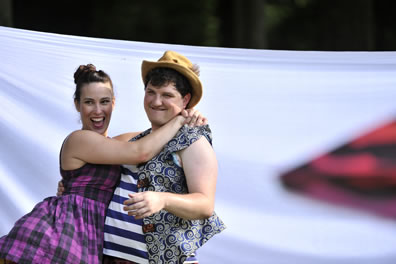As You Like It
Shakespeare's Playroom
Baltimore Shakespeare Factory, The Meadow at Johns Hopkins University's Evergreen Museum and Library, Baltimore, Maryland
Saturday, August 1, 2015, lawn at the center front of play space
Directed by Chris Cotterman

Sylvius (Tavon McLaughlin, right) dotes on Phoebe while Phoebe (Charlotte Blacklock) frowns upon Sylvius and dotes on Ganymede in the Baltimore Shakespeare Factory's outdoor production of William Shakespeare's As You Like It. Photo by Will Kirk, Baltimore Shakespeare Factory.
Let's start at the end. Hyman (Andrew Gelos), in a white Grecian robe, is throwing gold glitter into the air and consequently showering Sylvius (Tavon McLaughlin) with it as the other actors stifle their laughter. "There is mirth in heaven when earthly things made even atone together," the ridiculous-looking Hyman singsongs.
Let's go back to the beginning. Orlando (Zach Bopst) earnestly relates how his arrogant elder brother abuses and dishonors him to the family servant, old Adam (Gelos). "The spirit of my father, which I think is within me, begins to mutiny against this servitude. I will no longer endure it," the strapping Orlando declares.
So how do we get from here to there? As you like it.
The title of William Shakespeare's pastoral comedy As You Like It says more about the play's intent than many directors perhaps realize. The play is considered by scholars and many (but maybe not most) theater practitioners to be among Shakespeare's great works, certainly one of his top-tier comedies. The play's vividly drawn and singularly rich characters, timeless jokes, and romantic verse make it so. But the play has a slap-dash plot with more holes than there are tunnels in New York, a contrived dramatic device (the girl Rosalind disguised as the boy Ganymede pretending to be the girl Rosalind to court her boyfriend Orlando), and that silly ending with Hyman, the god of marriage, suddenly showing up to make all right. "Peace, ho, I bar confusion. 'Tis I must make conclusion of these most strange events," he says, though his appearance is the strangest event of all—so strange most productions cut him.
The Baltimore Shakespeare Factory is a shoestring operation (though it is halfway to its goal of creating a fund that will provide its annual summer season of Shakespeare in the Meadow free to the public for the next three years). However, what sets it above many better-endowed companies is its fealty for and trust in Shakespeare's craftsmanship. In directing this As You Like It for its outdoor meadow stage, Chris Cotterman doesn't try to mine the text for deep-meaning subtext or corral any conceptual context out of the script. He accepts what Shakespeare has given us at face value and, in turn, gives the production's audience of a couple hundred picnicking fans and families an entertaining spectacle eliciting laughs through the play's lines and character development. "The play is a bit like a messy playroom where Shakespeare left his toys out all over the floor," Cotterman writes in his program notes. "But what a wonderful mess of toys to play with!"
With costuming by Stephanie Parks in a hodgepodge of styles—from Orlando's Aladdin-like vest and pants to Rosalind's trendy high-low skirt over lace shorts, from Duke Frederick's leather jacket and wrist cuffs to the Balkan-style vests of the shepherds—this production reveals the play to be Shakespeare's forerunner to a burlesque show. Rosalind (Lynn Favin) sometimes even sounds like an emcee charged with introducing the next act: "Look you, who comes here; a young man and an old in solemn talk"; "Here comes my sister, reading"; "If you be a true lover, hence, and not a word; for here comes more company."
And do we have a really good show lined up for you:
- a wrestling match between Charles (McLaughlin in a blue-and-white Mexican wrestling mask and gold cape) and Orlando (wearing a Zorro-like black mask)!
- a catechism by an old shepherd and a motley fool on country life versus court life!
- a treatise by Sylvius on what it means to love!
- a dramatic tale by Oliver (Alan Rosenberg) on how he was attacked by a snake and a lioness before his younger brother saved him!
- the great philosopher Jaques (Kevin Griffin Moreno) reciting "All the world's a stage"!
- the sluttish shenanigans of Audrey (Jessica Lynne Byars)!
- musical interludes by Amiens (Charlotte Blacklock) and his merry minstrels!
- And tonight's feature performer, Will Kemp, er, Touchstone (Phil Vannoorbeeck)!
Touchstone is a Will Kemp-like role (the famous Elizabethan comedian played Peter in Romeo and Juliet, for sure, and probably similar roles such as Bottom, Dogberry, Lance, Gobbo, and the huge triumph that was Falstaff). If written and staged in 1599, as many scholars believe, As You Like It would have been Kemp's last play before leaving Shakespeare's company, the Lord Chamberlain's Men. The personnel dynamics in the company at the time might have had something to do with the way As You Like It plays like a vehicle for Kemp (perhaps against Shakespeare's will, whose next play, Hamlet, takes specific aim at stage clowns such as Kemp). While the first half of As You Like It has some semblance of organized narration, the second half narration is interrupted in every other scene with a skit featuring Touchstone (usually with Audrey). Here they are not getting married by the country clergyman Oliver Martext (Gelos); here they are with Audrey's hitherto unmentioned suitor, William (Mitch Monin); here they are listening to Amiens and his musicians sing "With a hey, and a ho, and a hey-nonny-no," so famous a tune that today's audiences can sing along. None of these scenes contribute to the play's plot and all could be cut without much loss. Touchstone has one more schtick leading up to the play's finale, his description of a quarrel on the seventh cause; but this is the only bit Cotterman excises. That turns out to be his production's only blemish, for I would love to see Vannoorbeeck, who plays Touchstone with hilarious pontificating mannerisms, deliver this speech.
Cotterman otherwise leaves the text mostly intact—and many of the actors speak the verse fluidly—but he cuts against convention with some of his cast-doubling choices, and these prove enlightening. Rather than doubling Duke Frederick with his usurped elder brother Duke Senior, this production has David Forrer playing Duke Senior and Corin, the old shepherd. Both come off as benevolent, gentle souls in Forrer's playing, but his Corin displays more than a little giggling humor. He bestows a bemused aspect on Sylvius, enters into his debate with Touchstone on equal footing as a jester (cloaked in a veneer of dignity), and falls into laughing fits as he watches the city folk engage in their intelligentsia. Meanwhile, Duke Frederick is paired with Jaques: While the former is definitely more lethal, Jaques can be a real party-pooper, too, and Moreno even gives a biting edge to his description of encountering the fool in the forest, using his description of Touchstone as a jab at his fellow lords. However, when it comes to delivering Jaques's "All the world's a stage" speech, Moreno plays it simply and to the audience, letting Shakespeare's unadulterated words thrill us.
Favin's Rosalind is no demure woman, even in the court scenes before her banishment. She has to be the center of attention, whether she's watching the wrestling at court or stage-managing the various pairings of lovers in the Forest of Arden. (Even heading into the epilogue, she pushes Touchstone away as she says "It is not the fashion to see the lady the epilogue; but it is no more unhandsome than to see the lord the prologue.") She plants a kiss on the lips of Orlando when she presents him with her chain after he wins the wrestling match (that certainly is enough to keep him horny for four more acts); and when she's playing Ganymede she makes a constant effort to stand in swaggering mode, legs apart, shoulders back, arms hanging as if with bulging biceps. Celia (Shannon Ziegler) starts out as Rosalind's devoted BFF as well as doting cousin, but over the course of putting up with Rosalind in Arden, Celia grows more shrill. Latching on to Oliver at first sight could be her parachute.
Oliver's arrival in Arden brings a bit of stage business that serves as the only dramatic interpolation this production brings to the text. After Rosalind (playing Ganymede) swoons upon seeing the handkerchief stained with Orlando's blood, Oliver lifts her up by wrapping his arms under her arms, and his hands freeze on her breasts. "You a man?" he shouts, swiftly moving away, embarrassed. As Rosalind/Ganymede insists she was counterfeiting, Oliver replies, "This was not counterfeit. There is too…" and Rosenberg's Oliver pauses a moment, his finger pointing to two somethings before he gathers himself and continues, "great testimony in your [another pause] complexion that it was a passion of earnest." He makes it clear in the way he calls her "sister" later that he knows her ruse, but he doesn't let his brother know (I should mention here that in this production, Oliver is present at the wrestling match in Charles's corner—Adam is present, too, in Orlando's corner—so Oliver knows the two princesses, Rosalind and Celia).

William Shakespeare's As You Like It can play like the Touchstone show, especially when the motley fool is played in the manner of Phil Vannoorbeeck's performance, here with Jessica Lynne Byars as Audrey, in the Baltimore Shakespeare Factory's production. Photo by Will Kirk, Baltimore Shakespeare Factory.
The show's most delightful performances belong to the fourth and final couple to consummate in the play, Phoebe (Blacklock) and Sylvius. McLaughlin's Sylvius is so wrought with love for Phoebe, he can't help crumpling into a forlorn heap on the ground, moaning in agony (poor guy ends the play shaking grass and glitter off his costume). As Rosalind reads Phoebe's "chiding" letter, you need to keep your eyes on McLaughlin as his Sylvius listens with increasing anguish, hearing Phoebe write of her lust for Ganymede. "Call you this chiding?" he says with a broken, bewildered voice that earns one of the night's biggest laughs. Blacklock's Phoebe, upon seeing Ganymede, shudders with excitement and slips into model mode, posed just so with hair flipping—she doesn't even need a fan, she can make her hair flow out all by itself. Yet, in the finale when she realizes, upon seeing that Ganymede is really Rosalind, that her fate is with Sylvius, her acceptance is genuine. By seeing the true love in Orlando and Rosalind that has gone beyond lust to survive separation, perhaps Phoebe recognizes what a treasure she has in Sylvius's devotion.
In his program notes, Cotterman writes that he noticed "an undercurrent of resignation and acceptance" running through the play. He compares it to the finale of "The Wife of Bath's Tale" in Chaucer's Canterbury Tales (and, as Cotterman notes, Shakespeare was a Chaucer fan), in which the knight submits to his love by saying, "For, as you liketh, it sufficeth me." In Shakespeare's As You Like It, "The choice to relinquish control—to trust someone or something else—is one that just about every character faces in some way," Cotterman writes. It's something directors and audiences must face with the very play, too. And when they give in, this play more than sufficeths.
Eric Minton
August 6, 2015
Comment: e-mail [email protected]
Start a discussion in the Bardroom



 Find additional Shakespeareances
Find additional Shakespeareances